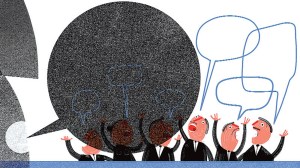Liberty in adversity
The Trojan Horse isn't, after all, an overflogged metaphor. Two seasons ago, on a `dry run' through prohibition country aboard the Kerala E...

The Trojan Horse isn’t, after all, an overflogged metaphor. Two seasons ago, on a `dry run’ through prohibition country aboard the Kerala Express, we rolled into Guntur Junction in Andhra Pradesh around midnight. My fellow passengers, half a dozen rhetoric-sick frontline artillerymen, were in a spin on a higher `spiritual’ odyssey. Their crew-cut olive bonhomie, in these drier climes, signalled the possibility of the sort of debauchery that even an honourable Member of Parliament would have given up his sundry quotas for.
A pair of furtive eyes exquisitely hooded under the platform neons came to rest insinuatingly upon the unshuttered windows. Another pair began to evolve in the shadows. Gleaming with fluid intelligence, they precisely and purposefully zeroed in on the men in fatigues, completely ignoring me. They clearly knew the `civil’ from the `uncivil’. Fluorescent whispers and a cup of nonchalance later, the duo were aboard. Conspiracy knew no better medium, or finesse a better moment.
The artillerymen went into action with the premeditated discretion that probably becomes second nature on the frontier. Out slithered a black tin trunk. In the fluorescence lay a connoisseur’s fantasia. Half a dozen genies were spirited out for a fortune. A killing was quietly made, at more than twice the going market price. The fantastic exorcism past, the trunk slunk back into position. The `killing fields’ were here and now far and away from any frontier.
To recall the classical Trojan Horse, fortune flowed from the barracks of ennui. Money was clearly in short supply, or who would compromise the cup that cheers for a few pieces of silver? The virtues of administered adversity are many, for it works either way in political economy.Would the Fifth Pay Commission, however, redress the situation of the olive-stricken multitude. What is the `moral’ political economy of prohibition? Obviously, hard economics militates against the dividends of prohibition, as post-NTR Andhra realised. While liberation was apparently central to the politics of prohibition, expediency sought to cash in on a larger constituency — women.
While this is the uncharitable view, one may also find redeeming elements of a gendered class struggle. While mostly lower-middle to lower-class women helped shut liquor shops through sheer force or classical left-of-centre `gender hegemony’, what the movement opened up was the political unconscious of gender itself.
Unleashed then were political fragments salvaged from gender inequity. However, inequity is rarely ever embarrassed by numbers. In this case, they are represented by percentages of Parliament seats. While the game of political percentage is unfair enough, gender calls for far more radical modes of liberation.
The fiftieth year of Independence is illiberal, if the Parliamentary debate on the question of women’s representation was anything to go by. But then, didn’t suffragettes fight for electoral rights well into the twenties?Who, then, is afraid of Sharad Yadav? In the history of consciousness, the late twentieth century in the largest democracy ought to be a big step for menkind in debating if women should at all and, if so, in what numbers, seek the Parliament of fame.
To come back to the original sin, if the community of men be a fraternity of tipplers, carpetbaggers and Parliamentarians, then gender by default is fairly close to liberation. Imagine, then, a pack of women pulling out a black tin trunk and giving the original Parliamentarians a run for their fun, frolic and fortune.



- 01
- 02
- 03
- 04
- 05




























